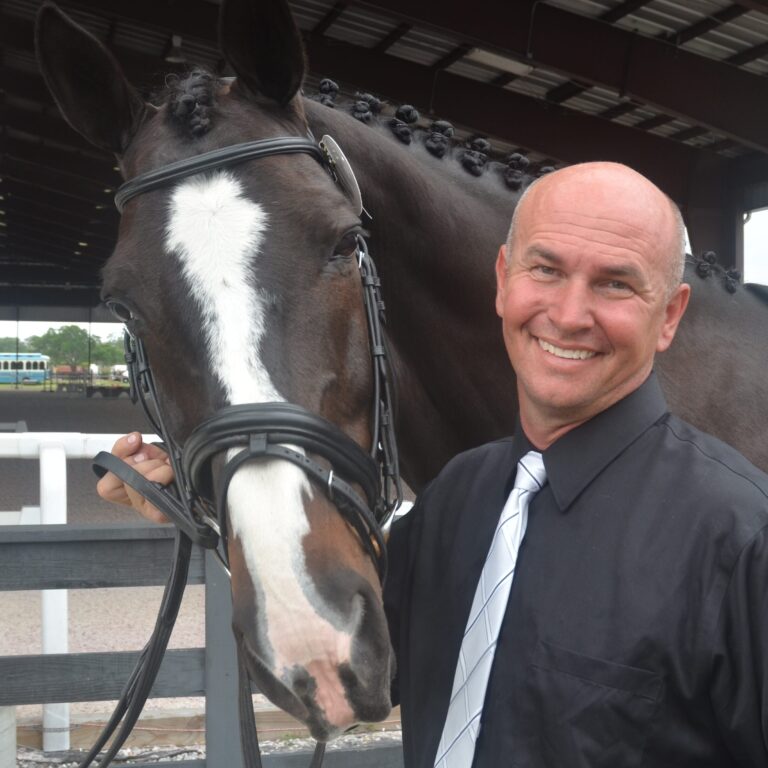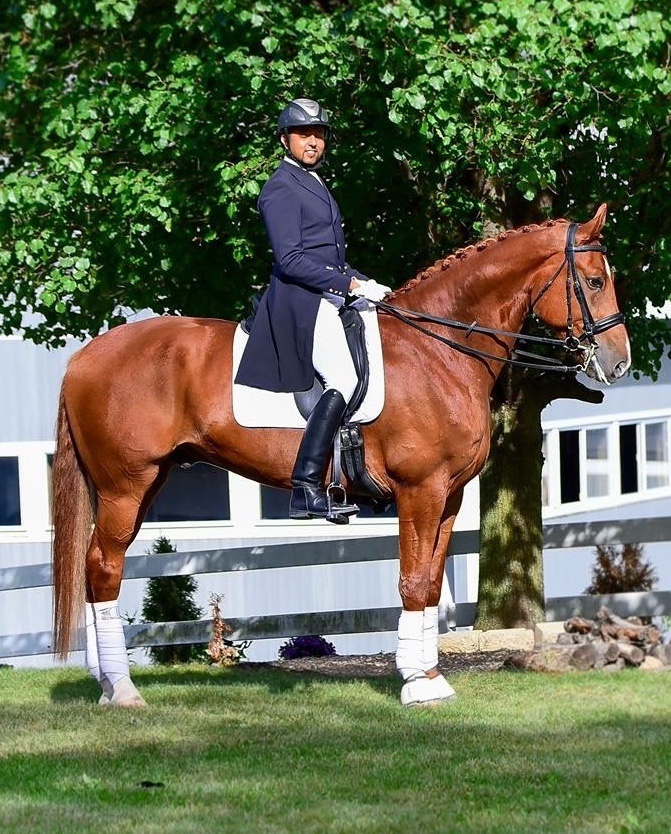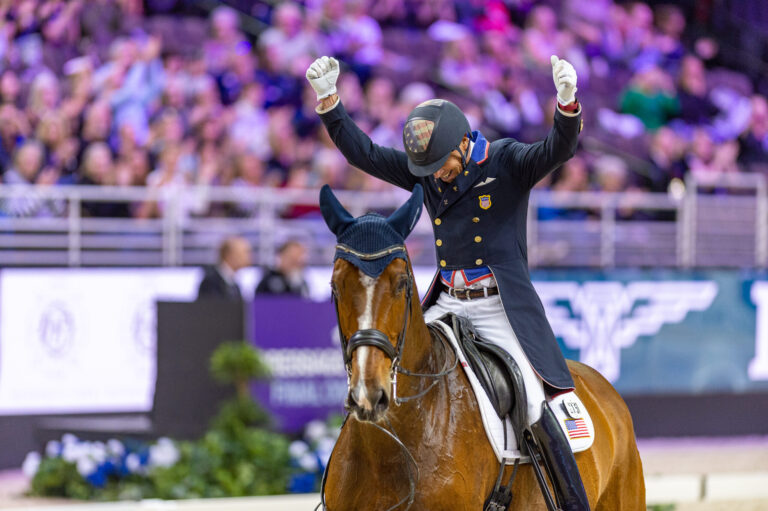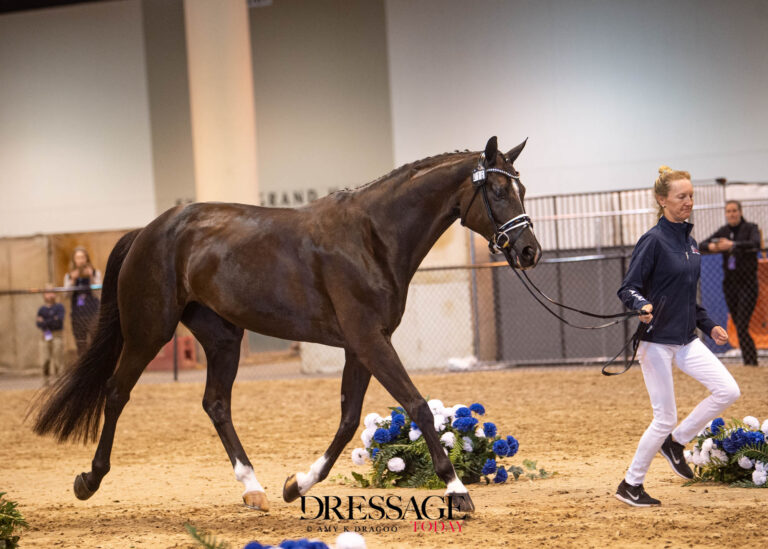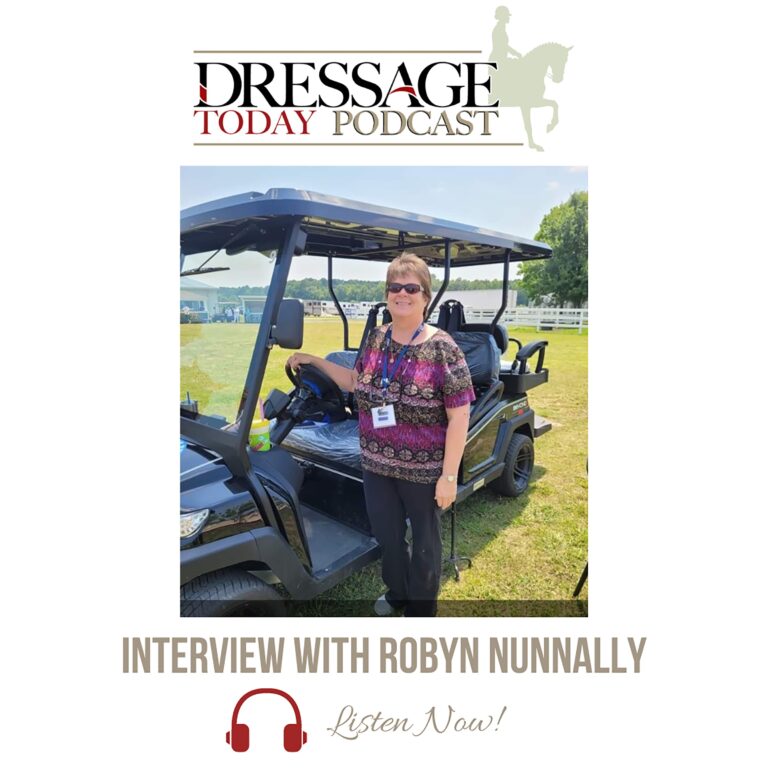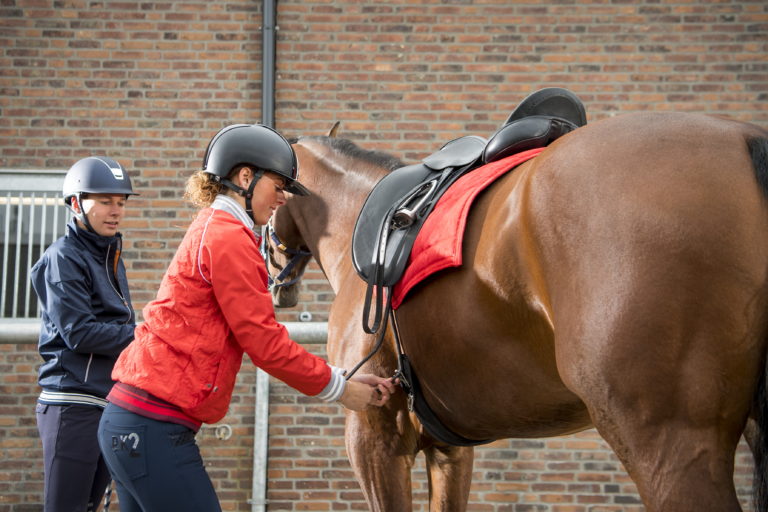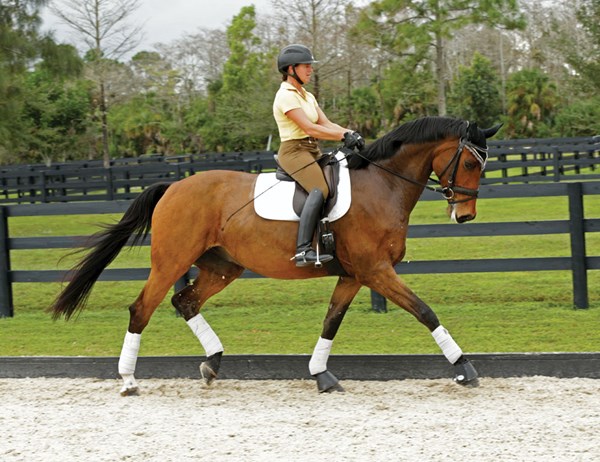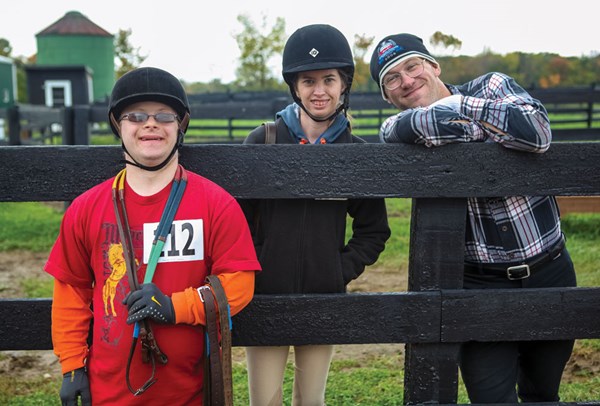
As he trains for the biggest equestrian event of his life, Jeremiah Schedlock isn’t leaving much to chance. On any given week, you can find him taking lessons on three different horses: Reba, a 14-year-old Quarter Horse; Dexter, a 12-year-old Paint, and Zeke, a 23-year-old Appaloosa. Each one, he says, offers a little something different. “Reba’s a sweetheart. She’s teaching me hand coordination and rein work. Dexter really knows his stuff, but he’s a character and really likes to test people, and that’s exactly why I’m working with him. Zeke has a dressage background, and I’m learning a lot from him.” Schedlock, a 24-year-old from Prescott Valley, Arizona, hopes his strategy pays off at this summer’s Special Olympics World Games in Los Angeles, where he’ll compete in equitation, dressage and working-trail classes against riders from around the world.
Anyone who thinks that Special Olympics is merely a feel-good, everyone-wins kind of event might want to take a closer look. While there’s no shortage of uplifting stories among the participants, all of whom have an intellectual disability, the games are built upon serious competition. “A lot of people see Special Olympics as a therapeutic riding program,” says Special Olympics USA equestrian team head coach Marissa Brzescinski, who is also a rider and trainer based in Mocksville, North Carolina. “Though it has huge therapeutic value, it’s a sports organization. We’re teaching these athletes how to compete.”
The fact that all equestrians at World Games ride unfamiliar horses only ups the ante, she adds. “My athletes are doing stuff that would curl the hair of most riders. Imagine sending an Olympic rider to London in 2012 and saying, ‘Here’s a strange horse. Go do a dressage test!’”
A Global Phenomenon

With 7,000 athletes from 170 countries competing in a total of 25 sports, this summer’s World Games won’t just be the single largest event in Los Angeles since the 1984 Olympics—it will be this year’s biggest sports and humanitarian event anywhere in the world. The games, which run July 25–Aug. 2, will be watched by an estimated 500,000 spectators, supported by 3,000 coaches and 30,000 volunteers and broadcast on ESPN and ABC.
The Special Olympics World Games are held every two years and like the regular Olympics they alternate between summer and winter games. Equestrian sports have been a part of the World Games since 1987.
This year’s events will be held at the Los Angeles Equestrian Center. Because equestrians do not bring their own horses to the World Games, competitors rely on horses donated for the event, which consists of four disciplines—dressage, equitation, team relay and working trails. Depending on ability, riders may compete with or without assistance at walk only or walk and trot, or independently at walk, trot and canter. “The equitation classes are run like a typical equitation class, with riders riding together on the rail and then asked to perform a pattern one at a time,” explains Brzescinski. “The working-trail events are run like a typical trail class at an AQHA show. The dressage classes at World Games are identical to those at any large USDF-recognized show, but they’re only available to riders who can compete independently.”
Brzescinski, who served as assistant equestrian team coach at both the Special Olympics World Games in Shanghai in 2007 and Athens in 2011, says she was impressed with the ability of many of the riders, particularly given the fact that they were competing on unfamiliar horses. “I’ll be honest, there are many athletes I wouldn’t want to compete against. They’d ride circles around me and look great doing it.”
The 10 athletes who make up this year’s U.S. team include riders of every ability level, she adds. “I’ve got riders who live on their own, riders who have gone to college, riders who live in a group home. They come from every walk of life, every socio-economic group. I’m so glad World Games is in the States so we can finally show everybody what we can do.”
None of this would be possible without the vision and determination of the late Eunice Kennedy Shriver, whose disabled sister, Rosemary, inspired her to advocate for those with special needs for more than five decades. What began in 1962 as a small summer camp for disabled children at her home near Washington D.C. has blossomed to encompass nearly 5 million athletes with intellectual disabilities worldwide. As the sister of President John F. Kennedy and Senators Robert F. and Edward Kennedy, Shriver did more than promote equality, acceptance and inclusion for these athletes; she helped change attitudes about disability on both a small and large scale. Special Olympics has become a catalyst for social change for the more than 200 million people worldwide who have an intellectual disability.
Riding at the World Games

To qualify for the World Games, the 10 athletes selected for this year’s Special Olympics USA equestrian team must have won a gold medal at a Special Olympics equestrian competition at the state level. Most have been involved in Special Olympics for years. Schedlock has been riding at Horses with H.E.A.R.T. (Hands-on Equine Assisted Riding Therapy) in Chino Valley, Arizona, since he was 11 and has been part of Special Olympics since 2006.
Jennifer Maddox, 31, of Stockbridge, Georgia, has been riding since she was in kindergarten. Though this is her first World Games, she’s participated in Special Olympics for more than 13 years, competing in everything from alpine skiing to kayaking to softball. “Special Olympics has helped me to be more outgoing [and] realize my goals to be a good rider,” she says. “It makes me proud of myself.”
Jacob McManus, of Barrington, Illinois, who at 19 is the youngest member of the team, has been a Special Olympics athlete for 10 years. “Special Olympics teaches me to work hard, but if I mess up my practice, I get back to basics and try again,” he says. “I feel important and I like winning medals and ribbons. I’m nervous and excited.”
Christina Cooney, 37, of West Palm Beach, Florida, has been riding at Vinceremos Therapeutic Riding Center in Loxahatchee for nearly 25 years and was recently named Special Olympics Athlete of the Year by the Palm Beach County Sports Commission.
Cooney is hearing impaired and she uses sign language to communicate. Brzescinski says that posed no stumbling block at training camp in Indianapolis, Indiana, last fall during an introductory game of Uno. “Within only an hour or two of meeting, Jeremiah was trying to get Christina to teach him all the signs for the colors and numbers on the cards.”
This year’s equestrian competition will host 130 athletes from 27 different countries. Since there are no Western events at World Games, several of the American riders, like Schedlock, have had to learn to ride in an English saddle. Schedlock says transitioning from Western to English wasn’t much of a problem. “When I first saw it, I didn’t know what to think,” he says. “But it wasn’t bad. It’s more comfortable than it looks. It’s a neat change.”
The morning after opening ceremonies, each delegation will get an hour or two to select horses, and given the logistics of pairing so many athletes with a limited number of horses, each rider only gets to try two—if the first horse is rejected, he or she has to choose the second one. Each horse is then shared by two riders for the duration of the competition. “You have no clue if it’ll be a 16.3-hand warmblood or a 14.3-hand Quarter Horse,” says Brzescinski. “The next time these riders see that horse is about 20 minutes before they compete.”
That’s in the best of circumstances. At the Shanghai World Games, a typhoon postponed several events. To fit them all in, some riders had only a few minutes to warm up. “One rider got on her horse, took two laps around the ring at a trot and then went in to do her equitation class,” Brzescinski remembers.

Some of the horses donated for the games have therapeutic riding experience, though Brzescinski says it’s not essential. “I need horses that can do a dressage test. I need horses that can run a trail pattern. These riders know what they’re doing. These aren’t pony rides. I need your Third Level dressage horse to do a dressage test.”
At the World Games in Athens, Matthew Schoenbauer, of New Prague, Minnesota, won a gold medal in equitation. “At one point, a man gestured to me—it was his personal horse, the number-one dressage horse in Bulgaria,” Brzescinski recalls. “The horses we had in Athens were fantastically trained, top horses that had done nothing but dressage.”
Athletes provide their own helmets, tall boots or half chaps and their own stirrups and stirrup leathers along with any adaptive equipment they use, like rainbow reins. Coaches can read the test during competition, but some riders prefer to memorize it.
Brzescinski, who will have three assistant coaches in Los Angeles, has gotten creative about keeping tabs on the progress of her team and she posts training tips and offers encouragement via the group’s Facebook page.
“Training camp was the first time I’d seen most of them ride, so I came up with training plans for all of them. Once a month, their coaches send me a five-minute video of what they’re working on. They’re all in great hands at home.”
The Road to Los Angeles
Thirty-three-year-old Amanda Swazey, of Selinsgrove, Pennsylvania, started riding in the 1990s and has been part of Special Olympics for 13 years. She became a Special Olympics power lifter, swimmer and artistic roller skater and attended a Special Olympics summer sports camp, where she swam, played tennis and took golf lessons, all while making new friends. At the Random Canyon Therapeutic Riding Program in Selinsgrove, she rides a 23-year-old Paint gelding named Berry. Her gold medal in equitation at the state games qualified her for a spot at the World Games. In Los Angeles, she’ll compete in equitation, dressage and working trail in the walk and trot division.
Preparing for World Games has been all-consuming says her mother, Arden Miller. “Since training camp, she has had lessons twice a week and is working hard on the dressage pattern. We chalked the pattern on the driveway of a vacant house down the street and walk her through it.”
Swazey also makes time to exercise on her own with members of the Susquehanna University Equestrian Team, who have taken a personal interest in her riding journey. Swazey manages to balance it all with her part-time job at a grocery store and volunteering at a local food bank.
“Special Olympics has given Amanda a social outlet,” adds Miller. “They trained her to be a Global Messenger who can give presentations about the program, and she’s a member of the Athlete Representative Council for our program. She attends management-team meetings and was the co-master of ceremonies at the 2013 Special Olympics Leadership Conference.”

Swazey isn’t nervous about the competition. “I’m usually pretty calm,” she says. “I recorded the Olympics [in London] and watched it later, especially the horsey stuff. I just watched it for fun.” She says her coworkers at the store are excited about her trip to California. “They say, ‘Put me in your suitcase!’”
Though travel and accommodations for the athletes and team coaches are covered, their families and personal coaches must pay their own way. “At the World Games in Athens, we had a rider whose family took out a second mortgage just to be able to see him compete,” says Brzescinski.
Her own work as a Special Olympics coach is purely voluntary. “When a rider finally gets what the diagonal is or takes a lap around the arena without stopping, that’s my payment. I’m a horse lover, and these riders just want to do what I do. How can I not pass on my passion to someone else? We’re all about inclusivity. If you don’t qualify as an athlete, come be a coach or a volunteer.
“I love what World Games is all about,” she adds. “These riders who are going to Los Angeles are doing something most people will never have the chance to do. They’ll meet equestrians from Great Britain to Japan to Australia and instantly have a connection with them. It’s an amazing opportunity.”
Schedlock says he isn’t sure what to expect when he arrives in Los Angeles, but he’s enjoying the journey so far. “Whatever we’re doing, I’m looking forward to it and I’m ready for it. I think it’ll be a neat experience.”
Get to Know the Other Members of the Special Olympics USA Equestrian Team
Lisa Berlin, 48, of Telford, Pennsylvania, rides at Ivy Hill Therapeutic Equestrian Center in Perkasie.
Allison Douglas, 25, Thomasville, North Carolina, grew up on a horse farm and has been riding since she was 3 years old.
World Games veteran Kyle Dutiel, 34, of Brandon, Mississippi, has participated in golf, track and field, basketball and bowling.
Robert Seignious, 21, of Bluffton, South Carolina, has also participated in the Special Olympics North America Tennis Championships.
Benjamin Stevick, 26, of Laurel, Maryland, has been involved in Special Olympics for 15 years, participating in alpine skiing, soccer and swimming. He says he overcame his fear of horses to try equestrian events.
Want to Be a Special Olympics Coach?
If you’re interested in becoming a coach or starting a Special Olympics program at your facility, you’ll need to contact your state’s Special Olympics office to find out when the next training program will be held. Coaches’ certification programs incorporate classroom and hands-on sessions. Certification requirements vary by state; some programs require coaches to be PATH-certified. For more information, go to specialolympics.org.
For more about the 2015 Special Olympics World Games, go to la2015.org.


